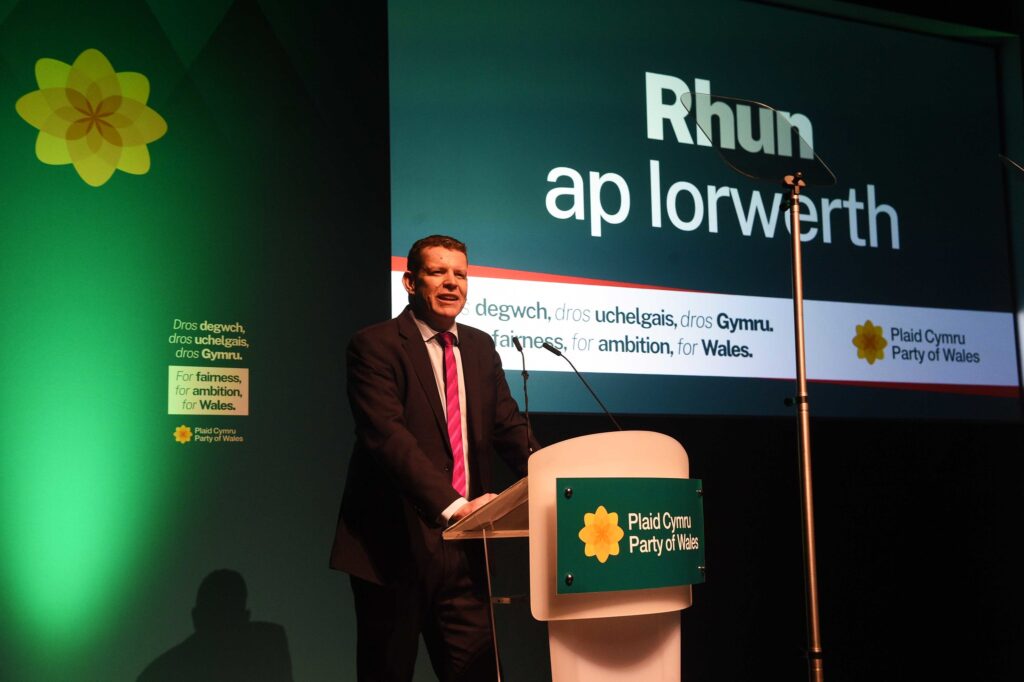Rhun ap Iowerth urges for the recommendations of the the Independent Commission on the Constitutional Future of Wales to be taken forward.
It has been just over two months since the Independent Commission on the Constitutional Future of Wales published its final report.
On the day of its publication, I welcomed it as turning point in our nation’s constitutional journey. It determined, of course, that independence is a viable option for Wales. This was the main headline on publication day, and for good reason.
This is the first time that an official report of this nature has confirmed what I have always believed: that Welsh independence is something entirely within our grasp, should we choose to reach for it.
The outgoing First Minister has been keen to stress that the key question is not whether independence is viable, but whether it is desirable. This could be a case of being careful what you wish for. As reflected in the growth in ‘indy curiosity’ in recent years, the case for Welsh independence has long resonated strongly with the heart. The Commission has provided an evidence base and an analytical framework that allows us to build convincing arguments from and for the head as well.
The Commission concluded unanimously that constitutional change is not only necessary, but likely inevitable, as the current devolution settlement becomes ever more unsustainable.
As I outlined at a recent event at the Norwegian Church Arts Centre in Cardiff Bay, it is my view that, in the long run, independence is the only viable and most sustainable option for Wales. It is the best way of delivering real ambition and fairness for our people and communities, and the only way of fundamentally transforming Wales’ economic fortunes. It is also the only way, ultimately, of protecting our democracy from those who would look to overrule it, or even to try and wipe it out altogether. For so long as our democratic institutions are subject to the whims of the Westminster Parliament, too much risk remains.
The Commission concluded unanimously that constitutional change is not only necessary, but likely inevitable, as the current devolution settlement becomes ever more unsustainable. In addition to creating a £1bn black hole in Wales’ public finances, Brexit has seen both the Senedd and Welsh Government consistently undermined and disrespected by the UK Government. It gives me no pleasure to say that Plaid Cymru was right to warn that ‘taking back control’ would only ever mean reconcentrating power in Westminster.
On the basis of more than 15,000 engagements with people from all walks of life and from right across Wales – including a concerted effort to seek the opinions of those in our society whose voices are often marginalised in constitutional debates – the Commission has demonstrated that contemplating and debating the kinds of constitutional change we need in Wales is no niche or minority occupation – something of interest only to the anoraks.
Rather, given the opportunity, people are demonstrably keen to explore the intrinsic connection between constitutional questions – about who holds power, how it is exercised and with what legitimacy – and the issues that affect them day-to-day. Constitutional questions aren’t a distraction from bread-and-butter politics: they are bread-and-butter politics. And the Constitutional Commission’s work has provided a model for engaging citizens in a wide-ranging, inclusive and deliberative discussion on the different and evolving options for our shared constitutional future.
This kind of public engagement with the future of Welsh democracy has never been more important. Aspects of the Commission’s report made for very worrying reading. Too many of our citizens feel like they lack knowledge about how government in Wales works, where responsibility for key decisions lies, and how they can influence the political agenda. The Commission has recommended the establishment of an expert advisory panel to oversee a new strategy for democratic innovation, community engagement and civic education. It has also called for a project to engage citizens around the creation of a statement of constitutional and governance principles for Wales, and sought assurances that the planned review of Senedd reform is appropriately robust.
On the latter, we in Plaid Cymru have been absolutely clear that we won’t settle for anything less than what has been recommended by the Commission. The review mechanisms that we have ensured are baked into the Senedd Reform Bill will be used, this review will be properly resourced, and it will provide for an evidence-based analysis of the impact of Senedd reform, including voters’ perspectives.
I am pleased that, through the Co-operation Agreement with the Welsh Government, we were also able to secure funding to implement a structure and programme to deliver on the Commission’s recommendations on democratic innovation and engagement. We now need to see this implemented, and the relevant structures established as a matter of urgency.
Syniadau uchelgeisiol, awdurdodol a mentrus.
Ymunwch â ni i gyfrannu at wneud Cymru gwell.
‘Urgency’ is the critical word here – the Commission was unambiguous on just how serious and pressing the challenges facing Welsh democracy are. Its ten recommendations on strengthening the existing devolution settlement are the absolute minimum we need to underpin any ambition we may have to build a more socially just society and to protect and strengthen our democracy in Wales. Over the past two months, I have been consistent in calling for an immediate start to the work of delivering on these recommendations, and for this work to be completed quickly.
For that reason, I welcomed last week’s Senedd debate on the Welsh Government’s formal response to the Constitutional Commission’s recommendations. In particular, I welcome that the Government has joined me in accepting these recommendations in full, both individually and as a package.
However, I am concerned that we still lack clarity around implementation – on the plan and timeline for delivery. We have, as I outlined above, agreed on the need for a programme of work and relevant structures to implement the Commission’s recommendations on strengthening Welsh democracy. However, the Government’s response to the Commission’s report contained no further detail on its view of what these structures will look like, and the overly vague promise that “further details of the overall programme of work will be published later this year”. I expect, and will continue to demand, greater clarity than this, and far sooner.
Likewise, on the Commission’s recommendations on energy, rail infrastructure and policing and justice, we lack a detailed plan on when and how devolution of the relevant powers will be delivered.
The work of the Independent Commission on the Constitutional Future of Wales has put Wales on the front foot when it comes to planning for processes of constitutional change, and we must look to stay there.
The Commission has called, for example, for the establishment of an expert group to ‘advise urgently on how the devolution settlement and inter-governmental engagement in relation to energy could be reformed to prepare for rapid technical innovation in energy generation and distribution, to ensure that Wales can maximise its contribution to net zero and to the local generation of renewable energy’. I would expect to see a further announcement from the Government on the make-up of and terms of reference for this group in short order.
It bears repeating that the Commission’s recommendations on the devolution of justice go further than what was on offer in the final report from Labour’s Commission on the UK’s Future (the ‘Brown Commission’), which proposed only limited further devolution of youth justice and probation. The incoming First Minister has intimated that he too regards these as the low-hanging fruit. But as the Constitutional Commission has made clear, piecemeal devolution in the areas of policing and justice runs the risk of making the edges of the present devolution settlement more jagged, not less. And of course, key members of Keir Starmer’s front bench have poured cold water on the idea of any part of justice being devolved to the Senedd. Can Vaughan Gething confirm that he has managed to change their minds?
Indeed, the Welsh Government’s response to the Constitutional Commission’s report stresses that securing some of the reforms it has outlined – including to intergovernmental relations, the Sewel Convention and financial constraints – will require negotiation with the UK government. They also insist that, in practical terms, this can’t happen until after a general election.
It’s hard to disagree that there’s little point opening negotiations on this – or anything else for that matter – with Sunak’s decaying Government. But I would suggest that the necessary discussions can and should already have started. If, as both the outgoing and incoming First Ministers have insisted, they have the ear of the UK Labour leadership, then surely the Welsh Government should be able to guarantee that further devolution will be delivered, how, and over what timescale.
The work of the Independent Commission on the Constitutional Future of Wales has put Wales on the front foot when it comes to planning for processes of constitutional change, and we must look to stay there. I have called for the creation of a standing national commission to ensure that the McAllister-Williams report is both acted and built upon. In addition to reiterating that call here, I would end by urging the Welsh Government to outline, in detail, how they see this work of protecting and strengthening Welsh democracy, of collecting and analysing the relevant evidence, and of facilitating citizen engagement with the options for our constitutional future, continuing to develop.
As both government and citizens in Scotland and Ireland continue to contemplate their political destinies, constitutional change across these islands is increasingly a case of ‘when, not if’. We must be ready to respond to changes elsewhere, whilst continuing to make the case proactively for the vibrant independent Wales I know we can be.
All articles published on the welsh agenda are subject to IWA’s disclaimer. If you want to support our work tackling Wales’ key challenges, consider becoming a member.





